Lasswell Harold D. The Political Writings of Harold D. Lasswell
Подождите немного. Документ загружается.

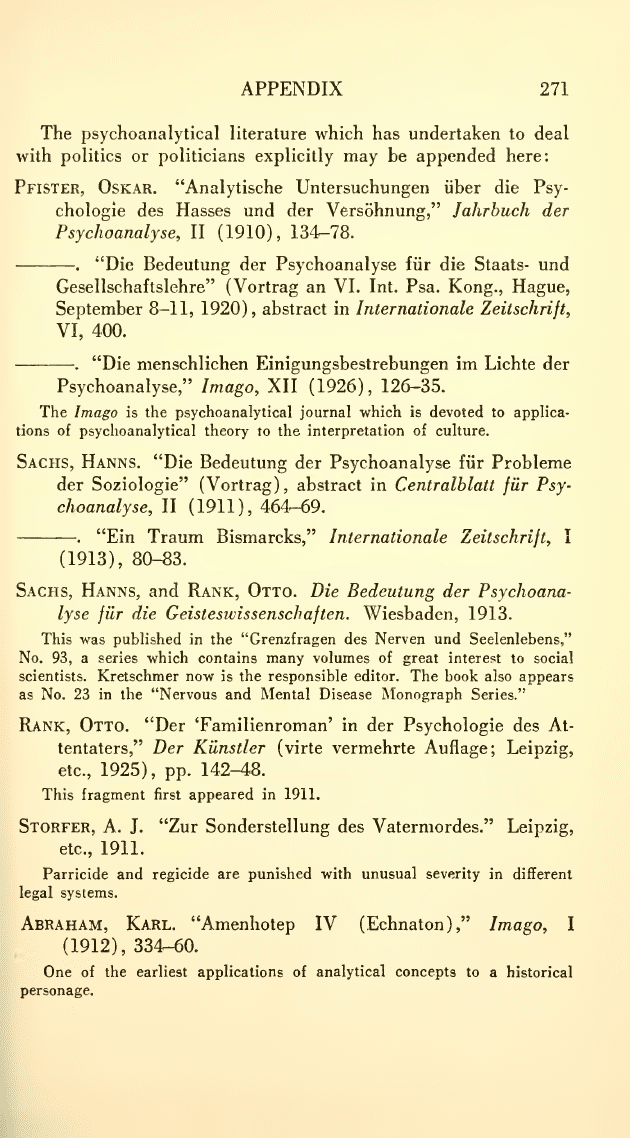
APPENDIX 271
The
psychoanalytical
literature
which
has
undertaken
to deal
with politics or politicians explicitly may
be
appended
here:
Pfister,
Oskar.
"Analytische Untersuchungen iiber die Psy-
chologic des Hasses und der Versohnung,"
Jahrbuch der
Psychoanalyse,
II
(1910),
134^78.
.
"Die Bedeutung
der
Psychoanalyse fiir die Staats- und
Gesellschaftslehre" (Vortrag an VI.
Int.
Psa. Kong., Hague,
September
8-11,
1920),
abstract in
Internationale
Zeitschrift,
VI, 400.
.
"Die nienschlichen Einigungsbestrebungen im Lichte
der
Psychoanalyse,"
Imago, XII
(1926),
126-35.
The Imago is the
psychoanalytical journal which is devoted
to
applica-
tions of psychoanalytical theory
to the
interpretation of culture.
Sachs, Hanns.
"Die Bedeutung
der
Psychoanalyse
fiir Probleme
der Soziologie"
(Vortrag), abstract in Centralhlatt
fiir
Psy-
choanalyse, II
(1911),
464-^9.
.
"Ein
Traum Bismarcks," Internationale
Zeitschrift, I
(1913),
80-83.
Sachs, Hanns, and
Rank, Otto. Die Bedeutung
der Psychoana-
lyse
fiir
die
Geisteswissenschaften. Wiesbaden, 1913.
This was published in the
"Grenzfragen
des
Nerven und
Seelenlebens,"
No.
93,
a
series which contains many volumes of
great interest
to
social
scientists. Kretschmer now
is
the responsible editor.
The book also appears
as No.
23 in the "Nervous and Mental Disease Monograph
Series."
Rank, Otto. "Der
'Familienroman' in
der Psychologie
des
At-
tentaters," Der
Kiinstler
(virte vermehrte Auflage;
Leipzig,
etc.,
1925),
pp.
142-48.
This fragment first appeared in 1911.
Storfer,
a.
J.
"Zur Sonderstellung
des Vaterniordes." Leipzig,
etc., 1911.
Parricide and regicide are
punished with unusual severity
in difiFerenl
legal
systems.
Abraham, Karl. "Amenhotep
IV
(Echnaton),"
Imago, I
(1912),
334-60.
One of the
earliest applications
of
analytical
concepts
to
a historical
personage.
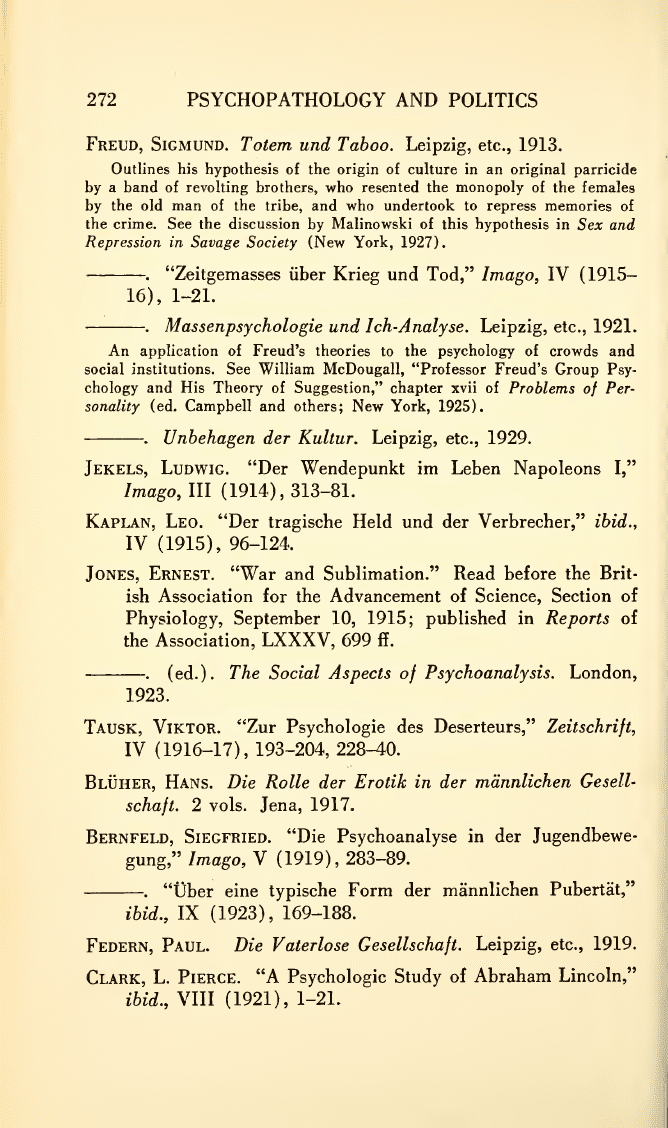
272
PSYCHOPATHOLOGY
AND
POLITICS
Freud, Sigmund.
Totem und Taboo. Leipzig,
etc., 1913.
Outlines his hypothesis
of
the origin
of
culture
in an original parricide
by a band of
revolting brothers,
who
resented the monopoly
of the females
by
the
old
man
of
the
tribe, and who
undertook
to
repress
memories
of
the crime. See the discussion
by
Malinowski
of this hypothesis
in
Sex and
Repression
in
Savage
Society (New
York,
1927).
.
"Zeitgemasses
iiber Krieg und Tod,"
Imago, IV
(1915-
16),
1-21.
.
Massenpsychologie
und
Ich-Analyse.
Leipzig, etc., 1921.
An application of Freud's theories to the psychology of crowds
and
social
institutions.
See William McDougall, "Professor Freud's
Group Psy-
chology and His Theory
of
Suggestion,"
chapter
xvii
of
Problems
of
Per-
sonality
(ed. Campbell
and others; New York,
1925).
.
Unbehagen
der Kultur.
Leipzig,
etc., 1929.
Jekels,
Ludwig. "Der Wendepunkt im Leben Napoleons I,"
Imago,
III
(1914),
313-81.
Kaplan, Leo. "Der tragische
Held und der
Verbrecher," ibid.,
IV
(1915),
96-124.
Jones,
Ernest.
"War
and Sublimation." Read before the
Brit-
ish Association for the Advancement of Science, Section
of
Physiology, September
10,
1915;
published
in
Reports of
the
Association, LXXXV,
699
£F.
.
(ed.).
The
Social
Aspects
of
Psychoanalysis.
London,
1923.
Tausk,
Viktor.
"Zur Psychologic des Deserteurs,"
Zeitschrift,
IV (1916-17),
193-204, 228^0.
Bluher,
Hans. Die Rolle der
Erotik in
der
mdnnlichen Gesell-
schaft.
2
vols.
Jena,
1917.
Bernfeld,
Siegfried,
"Die Psychoanalyse in der
Jugendbewe-
gung," Imago, V
(1919),
283-89.
.
"tJber
eine
typische Form der
mannlichen
Pubertat,"
ibid.,
IX
(1923),
169-188.
Federn,
Paul. Die
Vaterlose Gesellschaft.
Leipzig, etc., 1919.
Clark,
L.
Pierce.
"A
Psychologic Study
of
Abraham
Lincoln,"
ibid.,
VIII
(1921),
1-21.
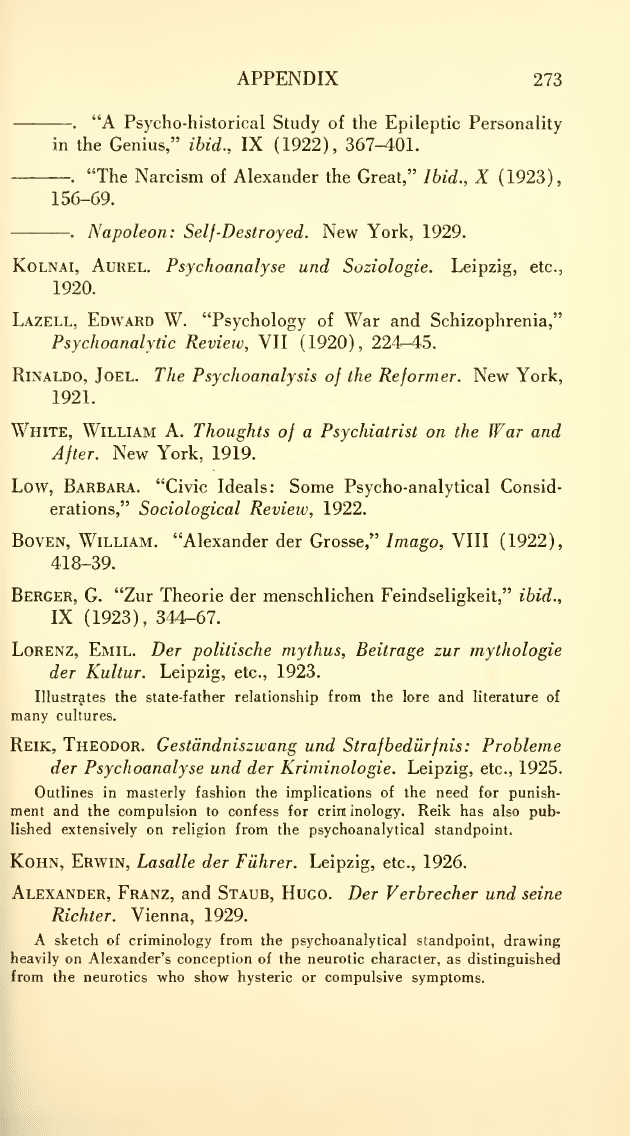
APPENDIX
273
—
.
"A Psycho-historical
Study
of the
Epileptic
Personality
in
the Genius,"
ibid., IX
(1922),
367-401.
—
.
"The Narcism of Alexander the
Great," Ibid.,
X
(1923),
156-69.
—
.
Napoleon:
Self-Destroyed.
New
York,
1929.
KoLNAi, AuREL. Psychoanalyse
und Soziologie.
Leipzig,
etc.,
1920.
Lazell, Edward
W.
"Psychology of
War
and Schizophrenia,"
Psychoanalytic
Revieiv, VII
(1920),
224-45.
RiNALDO,
Joel.
The
Psychoanalysis
of
the
Reformer.
New York,
1921.
White, William A. Thoughts
of
a
Psychiatrist
on
the
War and
After.
New York, 1919.
Low, Barbara.
"Civic Ideals: Some Psycho-analytical Consid-
erations," Sociological Review, 1922.
BovEN, William. "Alexander
der Grosse," /mago, VIII
(1922),
418-39.
Berger,
G.
"Zur Theorie
der
menschlichen Feindseligkeit," ibid.,
IX
(1923),
344-67.
LoRENZ, Emil. Der politische mythus, Beitrage
zur
mythologie
der Kultur.
Leipzig, etc., 1923.
Illustrates the state-father
relationship from the lore
and literature of
many
cultures.
Reik,
Theodor.
Gestdndniszwang
und
StrafbedUrfnis:
Probleme
der
Psychoanalyse
und der Kriminologie. Leipzig,
etc.,
1925.
Outlines in masterly
fashion
the implications of the need
for punish-
ment
and the
compulsion
to confess for criminology. Reik has
also pub-
lished
extensively on religion from
the
psychoanalytical
standpoint.
KoHN,
Erwin,
Lasalle
der Filhrer. Leipzig, etc., 1926.
Alexander, Franz, and Staub,
Hugo.
Der
Verbrecher
und seine
Richter.
Vienna, 1929.
A sketch of criminology from
the
psychoanalytical standpoint,
drawing
heavily on Alexander's conception
of the
neurotic character,
as distinguished
from
the neurotics
who
show
hysteric or
compulsive
symptoms.
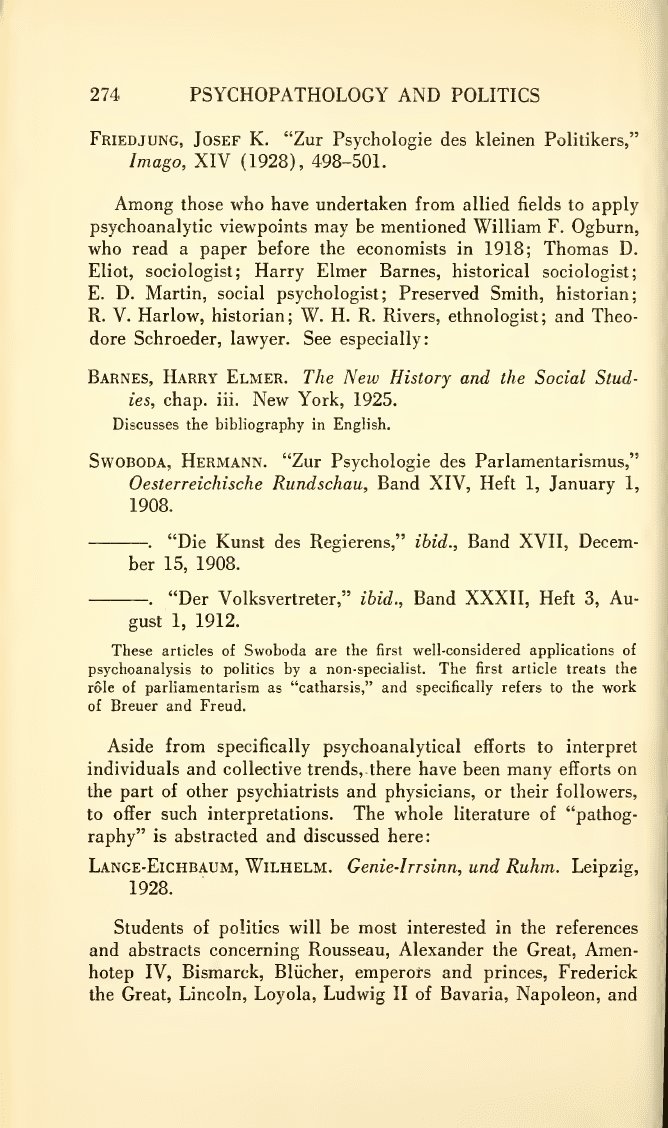
274
PSYCHOPATHOLOGY AND
POLITICS
Friedjung,
Josef
K. "Zur
Psychologic
des
kleinen
Politikers,"
Imago,
XIV
(1928),
498-501.
Among those who
have undertaken from allied fields to
apply
psychoanalytic viewpoints
may be mentioned William F.
Ogburn,
who read a paper before
the
economists in
1918;
Thomas D.
Eliot,
sociologist;
Harry Elmer Barnes, historical
sociologist;
E.
D. Martin, social psychologist;
Preserved Smith, historian;
R. V.
Harlow, historian;
W.
H.
R.
Rivers,
ethnologist; and
Theo-
dore Schroeder, lawyer. See especially:
Barnes, Harry Elmer. The
New History
and
the
Social Stud-
ies,
chap. iii.
New
York,
1925.
Discusses
the
bibliography
in
English.
SwoBODA, Hermann.
"Zur Psychologic
des
Parlamentarismus,"
Oesterreichische Rundschau, Band XIV,
Heft
1,
January
1,
1908.
.
"Die Kunst des
Regierens," ibid.. Band XVII, Decem-
ber
15,
1908.
.
"Der Volksvertreter," ibid., Band XXXII, Heft
3,
Au-
gust
1,
1912.
These articles of Swoboda
are the first
well-considered applications of
psychoanalysis to politics by
a
non-specialist. The
first article
treats the
role of parliamentarism
as
"catharsis," and
specifically
refers to the
work
of Breuer and Freud.
Aside from specifically
psychoanalytical efforts
to
interpret
individuals
and collective trends, there have been many efforts on
the part
of other
psychiatrists and physicians,
or their followers,
to
offer such interpretations. The
whole literature of "pathog-
raphy"
is abstracted
and
discussed
here:
Lange-Eichbaum, Wilhelm. Genie-Irrsinn,
und Ruhm.
Leipzig,
1928.
Students of
politics will be
most
interested in the
references
and abstracts
concerning Rousseau, Alexander
the Great, Amen-
hotep IV,
Bismarck, Bliicher, emperors and princes,
Frederick
the
Great,
Lincoln, Loyola, Ludwig II of Bavaria,
Napoleon, and
\
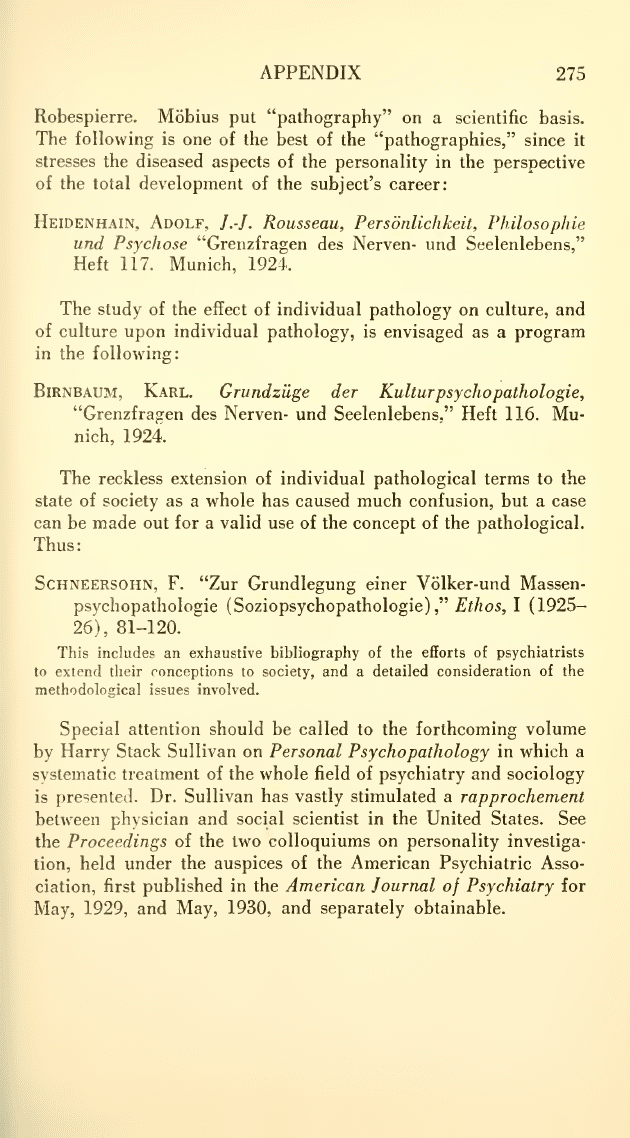
APPENDIX
275
Robespierre.
Mobius put
"pathography"
on
a scientific
basis.
The
following
is one
of the best
of
the
"pathographies,"
since it
stresses the
diseased
aspects
of the personality
in the
perspective
of
the total development
of the
subject's career:
Heidenhain,
Adolf,
/.-/. Rousseau,
Personlichkeit,
Philosophie
und
Psychose "Grenzfragen
des Nerven- und Seelenlebens,"
Heft 117.
Munich,
1924.
The
study
of
the effect
of individual pathology
on
culture, and
of culture upon
individual pathology,
is envisaged
as a
program
in the following:
BiRNBAUM,
Karl.
Grundzuge der Kulturpsychopathologic,
"Grenzfragen
des Nerven-
und Seelenlebens," Heft 116. Mu-
nich, 1924.
The
reckless extension
of
individual pathological terms to the
state of society
as a
whole
has caused much confusion, but
a
case
can be made out for
a
valid use
of
the concept of
the pathological.
Thus:
ScHNEERSOHN,
F.
"Zur
Grundlegung
einer Volker-und Massen-
psychopathologie
(Soziopsychopathologie),"
Ethos, I
(1925-
26),
81-120.
This includes an exhaustive
bibliography of the efforts of
psychiatrists
to
extend their conceptions
to
society, and
a
detailed
consideration of the
methodological issues
involved.
Special attention should be called
to
the forthcoming
volume
by
Harry Stack
Sullivan
on Personal
Psychopathology
in which a
systematic
treatment of the whole field of psychiatry and sociology
is
presented. Dr.
Sullivan
has
vastly stimulated
a rapprochement
between
physician and social
scientist in the United
States. See
the
Proceedings
of the two
colloquiums on personality
investiga-
tion, held
under
the auspices of
the American
Psychiatric
Asso-
ciation,
first
published in the
American Journal
of
Psychiatry
for
May,
1929,
and May,
1930,
and separately
obtainable.
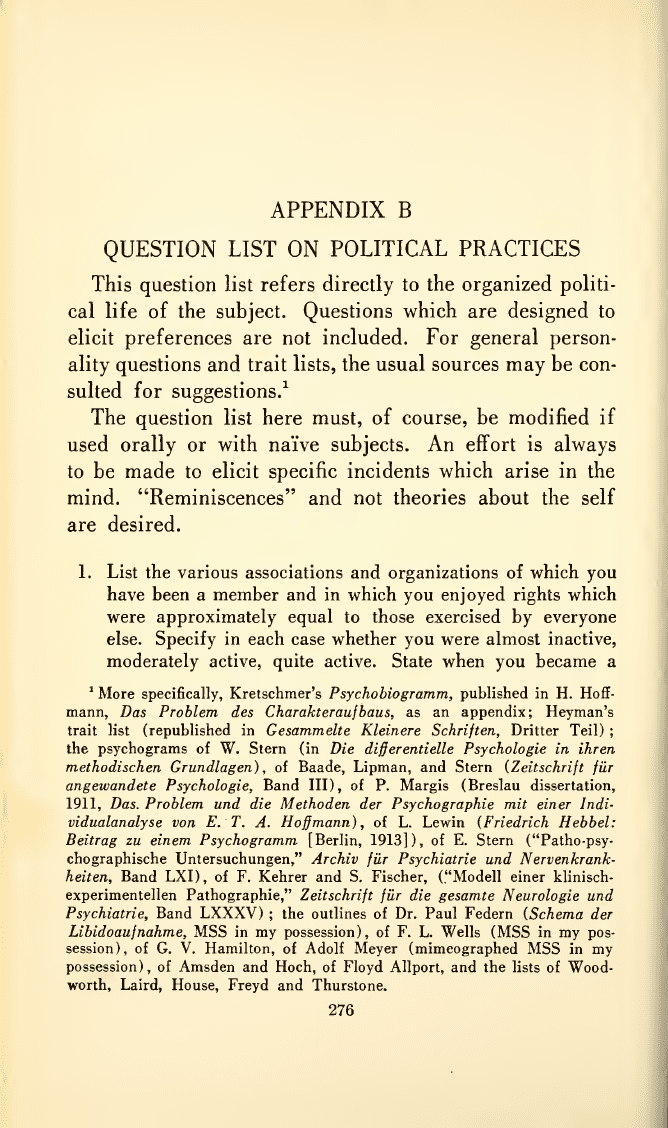
APPENDIX B
QUESTION
LIST
ON
POLITICAL PRACTICES
This question list refers directly to
the organized politi-
cal
life
of
the
subject.
Questions
which
are designed to
elicit preferences are
not
included. For general person-
ality questions
and
trait
lists, the
usual
sources may
be
con-
sulted
for suggestions.^
The question list here
must, of course, be modified
if
used orally or
with na'ive
subjects.
An effort is always
to be made
to
elicit
specific incidents
which
arise in the
mind. "Reminiscences"
and
not theories about the self
are
desired.
1. List
the
various
associations and organizations of which you
have been
a
member and in which
you enjoyed
rights which
were
approximately
equal
to
those exercised
by
everyone
else.
Specify in
each case
whether
you were almost
inactive,
moderately active, quite active.
State
when
you
became
a
'
More specifically,
Kretschmer's
Psychobiogramm,
published
in H. Hoff-
mann,
Das Problem des Charakteraufbaus, as
an appendix; Heyman's
trait list (republished in Gesammelte Kleinere
Schriften,
Dritter Tail)
;
the
psychograms
of W. Stern (in
Die
differ
entielle Psychologie
in ihren
methodischen Grundlagen)
,
of Baade, Lipman, and
Stern
{Zeitschrift
fiir
angewandete
Psychologie,
Band III), of
P.
Margis (Breslau dissertation,
1911,
Das. Problem
und die
Methoden
der
Psychographie
mit
einer
Indi-
vidualanalyse von E. T.
A.
Hoffmann),
of
L.
Lewin
(Friedrich Hebbel:
Beitrag zu einem Psychogramm [Berlin,
1913]),
of E. Stern
("Patho-psy-
chographische
Untersuchungen," Archiv
fiir
Psychiatrie und Nervenkrank-
heiten. Band LXI),
of F. Kehrer and S.
Fischer,
("Modell
einer
klinisch-
experimentellen Pathographie,"
Zeitschrift
fiir
die gesamte Neurologic und
Psychiatrie, Band LXXXV)
;
the outlines of Dr. Paul Federn
(Schema
der
Libidoaufnahme, MSS in my possession), of F. L. Wells
(MSS
in
my pos-
session),
of G. V. Hamilton, of Adolf Meyer (mimeographed
MSS in my
possession),
of
Amsden
and Hoch, of Floyd Allport,
and the lists
of Wood-
worth, Laird,
House, Freyd and Thurstone.
276
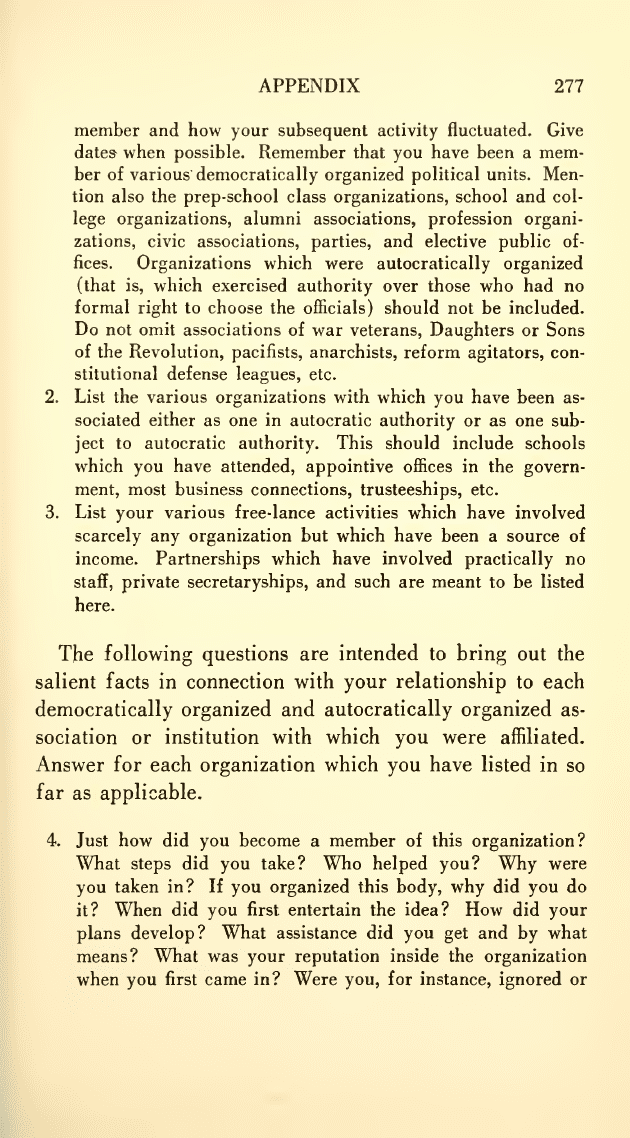
APPENDIX
277
member and
how your subsequent
activity fluctuated. Give
dates when possible. Remember
that you
have been
a
mem-
ber of
various
democratically organized political units. Men-
tion
also the prep-school
class
organizations, school
and col-
lege organizations,
alumni associations, profession organi-
zations, civic associations, parties,
and elective public of-
fices.
Organizations which
were
autocratically
organized
(that is, which
exercised authority over those who had
no
formal right
to choose the officials)
should not be included.
Do not
omit
associations
of war veterans. Daughters or Sons
of the Revolution, pacifists,
anarchists, reform agitators,
con-
stitutional defense
leagues, etc.
2. List the various
organizations
with which
you have been as-
sociated
either
as one in autocratic authority
or as one sub-
ject to autocratic
authority.
This should include
schools
which
you
have attended, appointive
offices in the govern-
ment, most business connections, trusteeships,
etc.
3.
List your various free-lance
activities which have involved
scarcely
any organization
but which have been
a source
of
income.
Partnerships
which have involved practically no
staff, private secretaryships,
and
such are meant
to be listed
here.
The
follov^^ing questions are
intended
to
bring
out the
salient facts
in
connection with your
relationship
to
each
democratically organized
and
autocratically
organized
as-
sociation or
institution with which you were affiliated.
Answer
for each organization which you have listed
in
so
far as
applicable.
4.
Just
how did you become
a
member
of this organization?
What
steps did you take? Who
helped you? Why
were
you
taken in? If
you
organized this
body,
why did
you
do
it?
When
did
you
first entertain
the
idea?
How did your
plans
develop? What assistance
did
you
get and by
what
means?
What was your reputation inside the organization
when you
first came in? Were you, for instance,
ignored
or
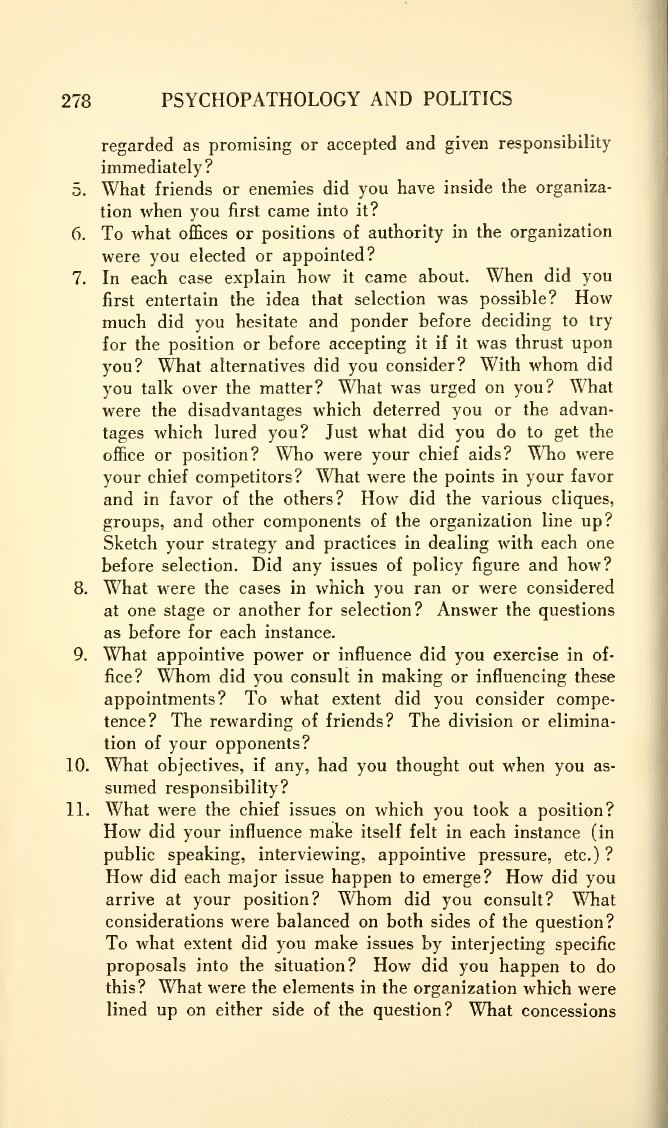
278
PSYCHOPATHOLOGY
AND
POLITICS
regarded
as
promising or
accepted
and
given
responsibility
immediately?
5.
What
friends or
enemies
did you
have
inside the
organiza-
tion
when you
first
came into
it?
6. To
what ofifices or
positions of
authority
in the
organization
were
you elected
or
appointed?
7.
In each
case
explain how
it came
about. When
did
you
first
entertain the idea
that
selection
was
possible? How
much
did you
hesitate
and ponder
before
deciding to
try
for
the
position
or
before
accepting it if
it was thrust
upon
you? What
alternatives did you
consider? With
whom did
you talk over
the matter?
What was urged
on you?
What
were
the disadvantages which
deterred
you or the
advan-
tages
which lured you? Just
what
did
you
do to get
the
office or
position? Who were your
chief aids? T^Tio
were
your
chief competitors? What
were the points in
your favor
and in
favor
of the
others? How did
the various cliques,
groups, and
other components of
the organization line up?
Sketch your strategy
and practices in dealing with
each one
before
selection. Did any
issues
of
policy figure and how?
8.
What were the cases in
which
you
ran or
were
considered
at
one stage or
another for selection? Answer the questions
as
before for each instance.
9. What
appointive
power or
influence did
you
exercise
in of-
fice? Whom did
you
consult in making or influencing these
appointments? To what extent did you consider compe-
tence?
The rewarding of friends? The division
or
elimina-
tion of
your
opponents?
10. What
objectives, if any,
had you thought out when
you as-
sumed responsibility?
11. What were the
chief
issues on which
you took a position?
How did your influence make itself felt
in each instance
(in
public
speaking, interviewing,
appointive
pressure, etc.) ?
How did each major issue happen
to
emerge?
How did
you
arrive
at
your position? Whom
did you consult?
What
considerations were balanced on both sides
of the
question?
To
what extent did you make issues
by interjecting
specific
proposals into the situation?
How did
you happen
to do
this? What were the
elements
in the
organization
which
were
lined up on either side
of the question?
What
concessions
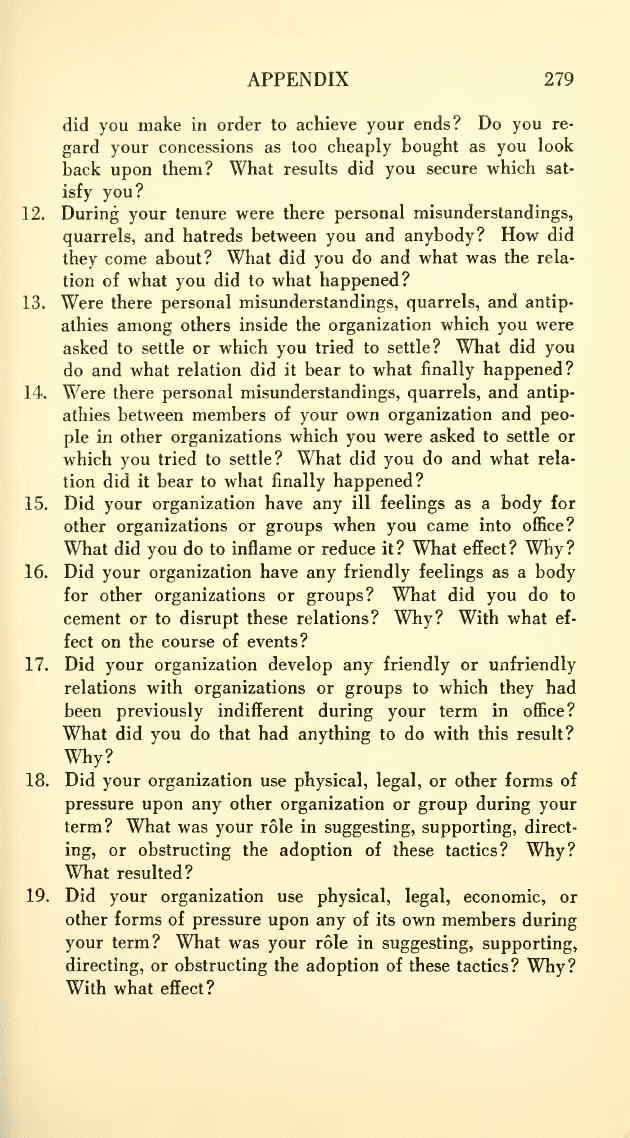
APPENDIX
279
did you
make in order to
achieve
your ends?
Do you re-
gard
your
concessions as too
cheaply
bought as you
look
back upon
them? What
results did
you secure
which
sat-
isfy you?
12.
During
your
tenure were
there
personal misunderstandings,
quarrels,
and hatreds
between you and
anybody? How
did
they come
about? What did you do
and what was
the rela-
tion of
what you did to what
happened?
13.
Were there
personal
misunderstandings, quarrels, and antip-
athies
among others inside the
organization
which
you
were
asked to settle or
which you
tried
to
settle? What
did you
do
and what relation
did it bear to what
finally happened?
14. Were there
personal
misunderstandings, quarrels, and antip-
athies
between members of your
own organization and peo-
ple in other
organizations
which you were asked to settle or
which
you tried to
settle? What did you do and what rela-
tion did it bear
to what finally
happened?
15.
Did your
organization have any ill
feelings
as a body for
other
organizations or groups
when you came into office?
What
did
you do to
inflame or reduce it? What effect? Why?
16. Did
your
organization
have any
friendly feelings
as a body
for
other organizations
or
groups? What did you do to
cement or to
disrupt these relations? Why? With what ef-
fect on the course of events?
17. Did your organization develop
any friendly
or
unfriendly
relations with organizations or
groups to
which they had
been
previously indifferent during
your
term in office?
What
did you
do
that had anything
to do
with this result?
Why?
18. Did
your
organization
use physical, legal,
or
other forms of
pressure upon any other organization
or group
during your
term? What was your role in suggesting, supporting,
direct-
ing,
or
obstructing the
adoption of these tactics?
Why?
What
resulted?
19. Did
your organization use physical,
legal, economic,
or
other forms
of pressure upon any
of its own
members during
your term? What was
your role in suggesting,
supporting,
directing,
or
obstructing
the adoption
of these
tactics?
Why?
With what effect?
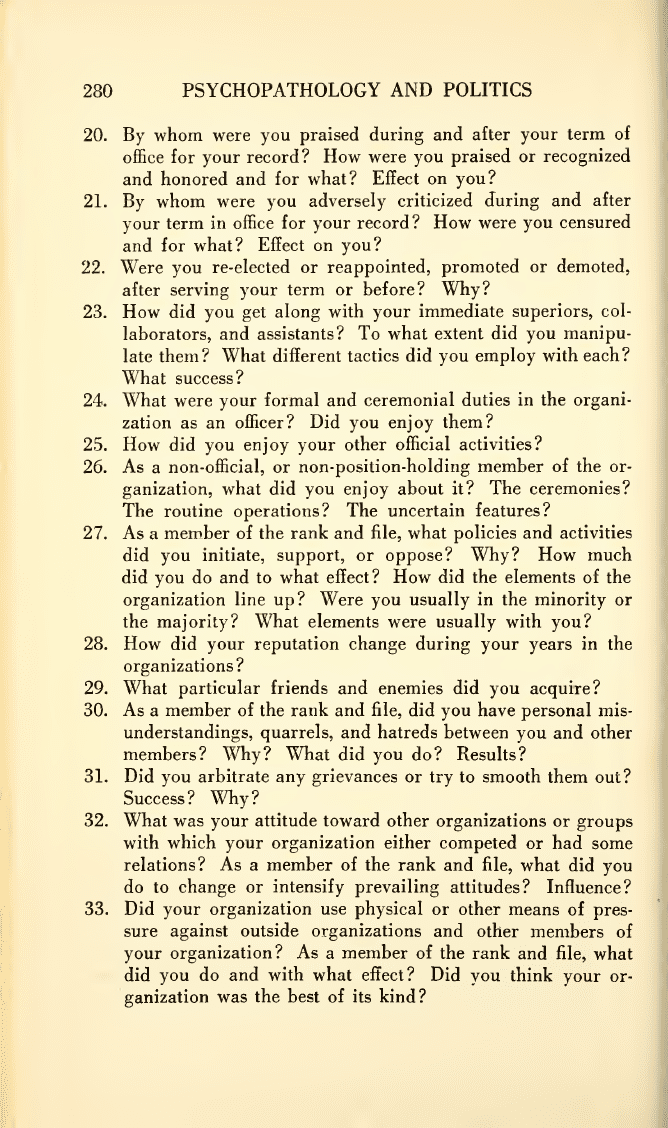
280
PSYCHOPATHOLOGY
AND POLITICS
20. By whom were
you
praised during and
after your
term of
office for your
record? How
were you
praised or recognized
and honored
and for
what? Effect
on
you?
21. By whom
were you
adversely criticized
during and after
your term in
office for your record ?
How were
you censured
and for
what? Effect
on you?
22.
Were you
re-elected or
reappointed,
promoted or demoted,
after
serving your term or
before? Why?
23.
How did you get
along with your
immediate
superiors, col-
laborators,
and
assistants?
To
what
extent did you manipu-
late
them?
What different tactics
did you employ with
each?
What success?
24. What were
your formal and
ceremonial duties in the
organi-
zation
as
an
officer? Did
you
enjoy them?
25. How did you
enjoy your other
official activities?
26. As
a
non-official, or
non-position-holding member of the or-
ganization, what did you enjoy about it?
The ceremonies?
The routine
operations?
The
uncertain features?
27. As
a
member of
the rank and file, what
policies and activities
did you
initiate, support,
or
oppose?
Why? How
much
did you do and to
what effect? How
did
the
elements
of the
organization line up? Were you usually in the minority or
the
majority? What elements
were
usually
with you?
28. How
did your reputation change during your
years
in the
organizations?
29. What particular friends and enemies did you acquire?
30.
As
a
member of the rank and file, did
you
have
personal mis-
understandings, quarrels, and
hatreds between
you and other
members? Why? What did you
do? Results?
31.
Did
you
arbitrate any grievances
or try to smooth
them out?
Success? Why?
32.
What was your attitude toward other
organizations or
groups
with
which your organization either
competed
or had some
relations?
As
a member of the rank and file,
what
did you
do to
change or
intensify prevailing
attitudes?
Influence?
33. Did
your organization use physical
or other means
of
pres-
sure against
outside organizations
and
other
members
of
your
organization? As
a
member of
the rank
and file,
what
did you do
and with what effect?
Did
you think
your
or-
ganization was
the best of its kind?
